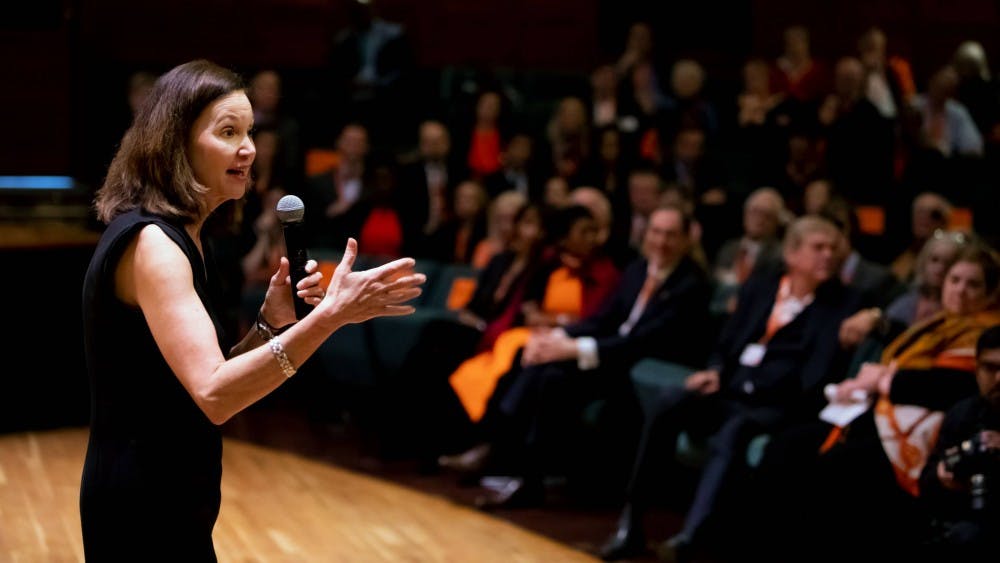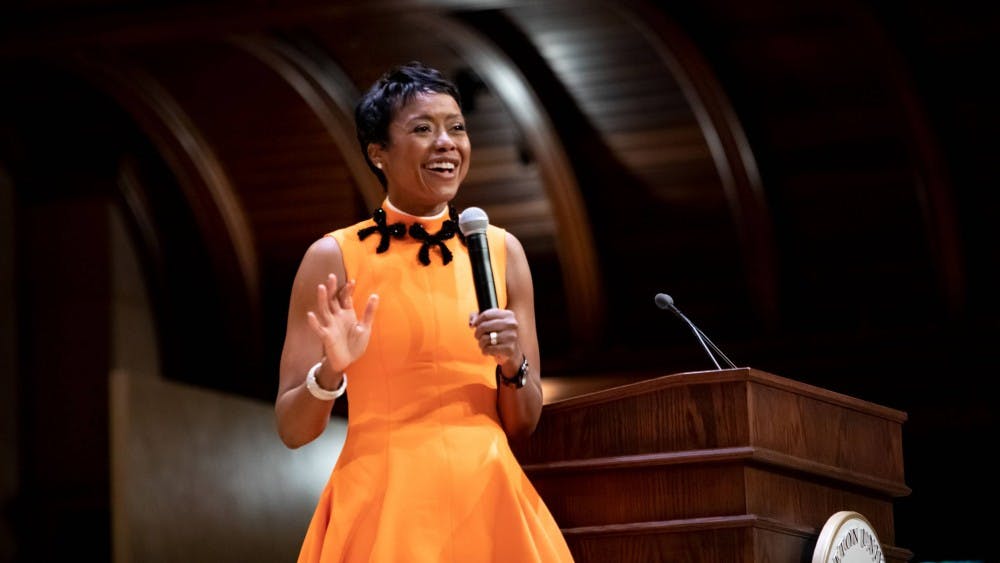Carol Quillen GS ’91 and Mellody Hobson ’91, recipients of this year’s top alumni awards — the James Madison Medal and the Woodrow Wilson Award, respectively — spoke on Saturday, Feb. 23 at the University’s annual Alumni Day, drawing an audience of alumni spanning generations.
Quillen, who serves as President of Davidson College, spoke about the power of education in the humanities in a lecture titled “Sustaining Democracy Through Storytelling.”
One of the primary challenges she spoke of facing as a leader in higher education is the constant questioning of the value of the humanities. She went on to recite the two conventional answers to this problem, then explained why she finds both unsatisfactory.
According to Quillen, humanistic scholars often respond to criticisms of the humanities by arguing that their studies either help develop the talent necessary to live as a free human or provide their students with critical thinking skills.
Quillen, however, finds the first response to be both vague and elitist and mocked the second response for its claim that the humanities “have a monopoly over critical thinking.”
Instead, Quillen articulated humanistic studies’ central lesson as two-fold: intellectual humility and empathy.
In the case of the former, the humanities uniquely instruct that there are always more stories hidden within ones already told. In the latter, humanities teach the scholar to hold “empathy both for the dead of whom you’re writing and for the living for whom you write.”
Deriving this answer to the question of the humanities’ worth, Quillen said, required looking back to her research at the University.
As a graduate student, Quillen studied the Renaissance humanists, and was particularly intrigued by what makes a group of people desire to emulate a past culture, particularly in a way that conceives of the culture as “simultaneously alien and exemplary.”
History professor Anthony Grafton, who advised Quillen’s Ph.D. dissertation, sat in the front row.

Carol Quillen GS ’91 was awarded the James Madison Medal at this year’s Alumni Day. Photo courtesy of Denise Applewhite of the Office of Communications.

Quillen then reflected on our society’s increasing fragmentation.
“We are self segregating into camps. We prefer to eat, pray, study, and even board airplanes with people who look like us,” she said.
The self-segregation also translates into an unhealthy and willful distortion of others’ points of view, said Quillen. She explained that “classifying others into categories” and “wanting the clarity of litmus tests” has undermined one of the founding principles of this country — pluralism.
In trying to restore a healthy way of orienting ourselves toward one another, Quillen thought back to her study of the humanists, and their perception of foreign cultures as both “alien and exemplary.”
“We need to view each others’ perspectives as stories that need to be understood, rather than opposing positions that need be refuted,” she said, emphasizing the power of storytelling in building bridges.
After a rousing reception of Quillen’s speech and a brief intermission, Hobson, who currently serves as president of Ariel Investments, took the stage for her speech, titled “A Bright, Orange Guiding Light,“ on the meaning of service in all the forms it may take.
Hobson reflected on her relationship with the University as a black woman.
“‘Exotic’ and ‘New Jersey’ don’t normally go together in a sentence, but when I first arrived to campus in the fall of ’87, New Jersey seemed so exotic to me,” she began. “I saw buildings named after people like Rockefeller and Forbes, and I have to admit … I felt like I belonged.”
Hobson looked back fondly on fully throwing herself into the University’s spirit as an undergraduate, from signing the Cottage Club bicker book that F. Scott Fitzgerald once signed to “walking on the same uneven sidewalks as Albert Einstein.”
Despite her profound love for the University’s traditions — she wore a bright orange dress and even mentioned that her favorite color is, indeed, orange — Hobson admitted that receiving an award named for Woodrow Wilson as a woman of color “requires some cognitive dissonance.”
“Despite the school’s colors, Woodrow Wilson failed to see that orange and black belong together,” she jokingly remarked, reflecting on Wilson’s well-known racism.
“I am not the first woman of color, however, to receive this award,” said Hobson proudly. “When you’re the first, you’re also the only, and I’d rather be one of many.”
Weaving personal stories throughout her speech, Hobson shifted to a discussion of her view of service.
“Service is the debt you owe society for this magnificent education,” she said.
Quoting Supreme Court Justice Sonia Sotomayor ’76, a past recipient of the Woodrow Wilson award, Hobson added that service doesn’t have to mean charity, but rather “tangible service in the one-on-one sense.”
Hobson said that her husband, Star Wars creator George Lucas, taught her to think of service in terms of scales — how can one do the most good for the most people? Lucas listened to her speech from the audience.
“Don’t just go retail, go wholesale in your service,” she recalled Lucas saying to her.
To Hobson, original thought ought to be highly valued in service, a lesson she feels her time at the University taught her. She recalled a preceptor in one of her courses who forbade the use of the phrase “to reiterate” in students’ comments.
“To this day, if I hear ‘to reiterate’ in a boardroom, I stiffen,” she said.
“Princeton’s motto gets at the true purpose of education,” continued Hobson. “You’re not here merely to make a living, you’re here to enrich the world.”
Despite Wilson’s legacy of racism, Hobson noted that his emphasis on the joy, not just the duty, of service, aligns with her views.
She used a torch as a metaphor for service.
“The torch doesn’t just illuminate the path, it also provides warmth to the holder,” Hobson said.








